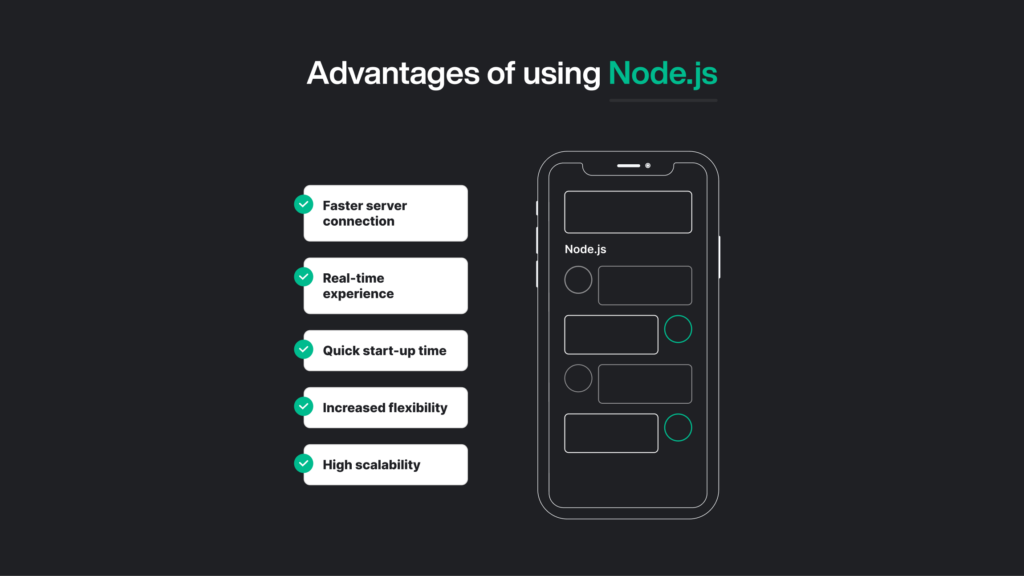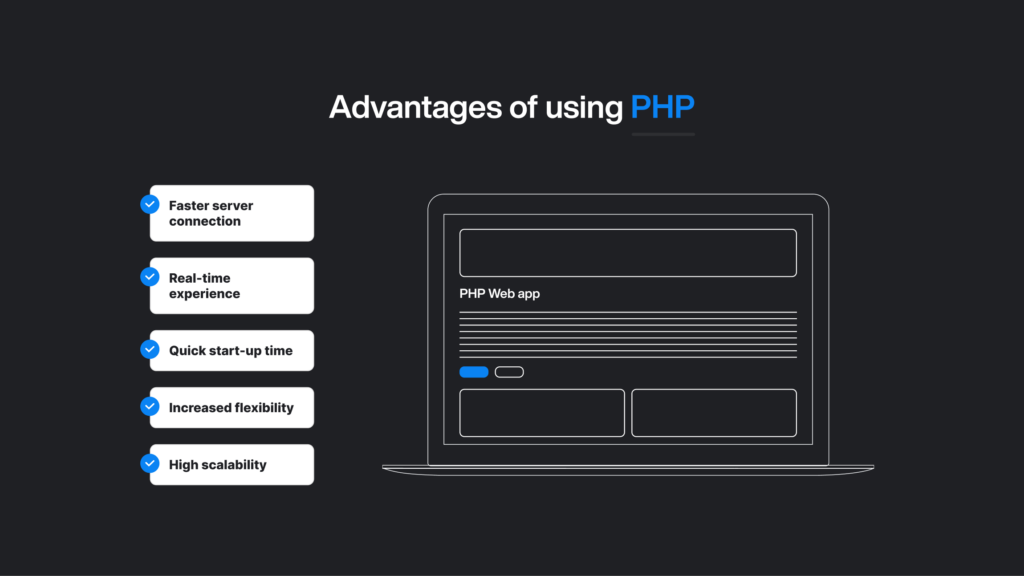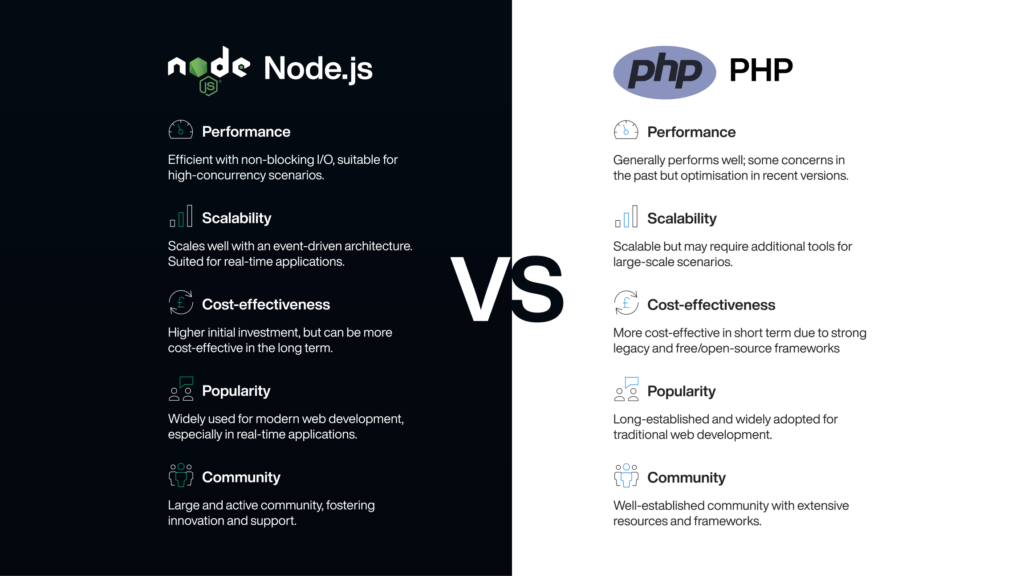Node.js vs PHP – which is the best for your project? The battle for backend development supremacy rages on. Node.js has an event-driven, non-blocking architecture and excels in real-time applications and fast data streaming, making it ideal for projects like chat apps and IoT solutions. However, with its mature ecosystem and robust frameworks, PHP shines in traditional web development, content management systems and e-commerce platforms. It can also be more cost-effective for building simpler web applications.
Understanding the use cases and aligning project needs with the strengths of these backend technologies is crucial for optimal performance and scalability. The choice can seem overwhelming, but we’re here to help you pick the right language for your project.

What is Node.js?
Node.js is an open-source, cross-platform JavaScript runtime environment that allows developers to run JavaScript code outside of a web browser. It was created in 2009 by software engineer Ryan Dahl, who used the event-driven architecture of web browsers as an inspiration to create a similar runtime environment for executing JavaScript server-side.
It is built on top of the Google Chrome V8 JavaScript engine and provides an event-driven, non-blocking I/O model. Node.js follows an asynchronous architecture and can handle many concurrent connections with minimal overhead. This makes it lightweight and ideally suited for building applications like web servers, APIs, microservices and real-time applications.

Pros of Node.js
Node.js has a number of important benefits that make it one of the most popular choices for building server-side applications.
- Faster server connection: Node.js’s architecture is event-driven and uses non-blocking I/O operations, which means that instead of waiting for I/O operations (like reading from the network or file system) to complete, Node.js can handle other requests in the meantime.
- Real-time experience: Node.js enables real-time, bidirectional communication between the server and clients. Tools like WebSockets and libraries like Socket.IO facilitate efficient real-time data transfer, making it ideal for building chat applications, collaborative tools and live updates across connected devices.
- Quick start-up time: Node.js leverages the V8 JavaScript engine. Its adaptive optimisation, efficient memory management and native code integration contribute to Node.js’s fast execution and performance over time.
- Increased flexibility: Node.js has a modular design. This allows developers to easily incorporate third-party modules from the NPM ecosystem and use NoSQL databases like MongoDB and CouchDB and graph databases like Neo4j.
- High scalability: Node.js can handle many simultaneous connections efficiently, enabling better utilisation of system resources. Additionally, Node.js can leverage clustering and load-balancing techniques to scale across multiple CPU cores or servers.
Cons of Node.js
While Node.js is an excellent choice for running Javascript server-side, and we love using it, its architecture is unsuitable for every scenario. It has a few drawbacks.
- Single-threaded model: Because of its single-threaded nature, Node.js can’t take full advantage of multi-core systems for parallel processing.
- CPU-bound operations: Node.js is not well suited for CPU-intensive tasks and operations like heavy computations or complex algorithms, as these can block the event loop, affecting overall performance.
- Unstable APIs: Node.js is known for updating the API version regularly. Changes between versions can lead to compatibility issues and require code updates.
- No GUI support: Because Node.js is mainly designed for server-side applications, it doesn’t offer native support for building graphical user interfaces (GUIs).
- Callback hell: Asynchronous programming in Node.js can lead to deeply nested callbacks, making the code harder to read and maintain – developers call this ‘callback hell’.
It should be added, however, that most of these drawbacks can be mitigated by implementing proper coding practices, tools and libraries. Node.js also has a very active community and continues to evolve, addressing concerns with each new release.
What is PHP?
PHP (Hypertext Preprocessor) is an open-source, server-side scripting language created in 1994 by Rasmus Lerdorf. It was designed primarily for web development, allowing developers to embed code within HTML to create dynamic web pages and applications. Millions of websites, especially within e-commerce, have been built using PHP.
While Node.js leverages the V8 JavaScript engine, PHP has its own interpreter that executes code directly. PHP developers praise its simplicity, ease of use and extensive features, including database support, file handling and numerous built-in libraries. PHP’s model makes it less suitable for building real-time applications and handling concurrent connections, although newer features include asynchronous programming support and process management tools.

Pros of PHP
PHP has been around for a long time, and with good reason: it has many benefits that have made it an excellent choice for web developers for the last 30 years.
- Feature-rich websites: PHP has extensive built-in functions and libraries, enabling developers to build robust and feature-packed applications efficiently. This makes PHP well-suited business websites, putting them ahead of the competition.
- Cost-effective for simple web apps: If your web application doesn’t need real-time communication or has to perform heavy computations, using PHP can be more cost-effective. Furthermore, many of PHP’s libraries and frameworks are free and open-source, reducing development costs compared to Node.js.
- Extensive community support: There are many online resources for PHP, including tutorials and documentation. A large, active community of developers contribute to various open-source projects, frameworks and libraries.
- Cross-platform versatility: PHP is a cross-platform language. It can be used for web development, content management systems and server-side scripting, and it runs on most operating systems without requiring significant modifications.
- Seamless web integration: PHP is designed to be embedded in web servers like Apache and Nginx, acting as a module or through FastCGI. This allows easy integration with HTML and other web technologies.
- Easy learning curve: PHP is easy to learn as a scripting language, especially for beginners. Its simple syntax makes it very approachable – it integrates seamlessly with HTML, allowing developers to create dynamic web pages quickly.
Cons of PHP
Unfortunately, there are a few drawbacks that you need to take into account before starting a project with PHP.
- Concurrency Limitations: PHP traditionally follows a synchronous execution model, which can make it less suitable for highly concurrent applications compared to Node.
- Performance: While PHP has improved its performance over the years, it may still lag behind some other languages, especially in highly concurrent or resource-intensive applications.
- Slow testing process: It can be slow to test PHP scripts because of the interpreted nature of the language. PHP doesn’t have many debugging tools compared to other coding languages, which makes it harder to look for errors in the code.
- Inconsistent Function Names and Parameter Order: PHP’s standard library can be inconsistent regarding function names and parameter orders, leading to confusion and errors for developers.
Node.js vs PHP: An in-depth comparison
Node.js and PHP each have unique strengths and weaknesses, but we’re here to help you make the right choice. Our in-depth comparison analyses their speed, performance, cost-effectiveness, modules, frameworks, database prowess, request handling and lines of code required, helping you choose the best solution for your projects.
Target audience
Node.js and PHP have their own specific target audiences. Node.js is tailored for full-stack JavaScript developers, putting emphasis on asynchronous, event-driven applications. It’s perfect for real-time and scalable scenarios and caters to modern learners with many online resources.
PHP has a broader appeal and is suitable for developers of various backgrounds. The language excels in web development and CMS. PHP’s simplicity and extensive library support make it accessible to a diverse audience.
Frameworks
Node.js frameworks are well-suited for building scalable, real-time applications with JavaScript. Popular frameworks include Express.js, Koa.js, Nest,js and Sails.js. PHP frameworks focus mainly on web development.
It offers tools for server-side scripting, MVC architecture and seamless database integration. Well-known examples are Laravel, Symfony and Yii. Both frameworks have advantages and disadvantages, but ultimately, the choice depends on specific requirements, developer expertise and the desired features of the application being built.
Cost-effectiveness
Regarding cost-effectiveness, PHP’s strength lies in its widespread adoption, extensive ecosystem, and suitability for simple web applications. It is a cost-effective choice for content management systems and simple web apps that don’t need real-time communication. However, Node.js excels in real-time applications, scalable APIs, and data-intensive tasks, leveraging its non-blocking architecture for efficient resource utilisation and reduced infrastructure costs in the long run. Ultimately, the choice depends on the project’s specific requirements, balancing short-term and long-term costs.
Performance
The performance of PHP and Node.js significantly impacts application execution and KPIs. Node.js is known for non-blocking I/O for real-time applications. PHP’s speed benefits from innovations like Hack and JIT compilation in PHG 8. Performance aspects are pivotal for efficient application development and optimal KPIs in choosing the right technology.
Security
Security starts with secure coding standards. Other PHP and Node.js security best practices include input validation and parameterised queries. Tools like PHPStan and Node Security Platform can help in detecting vulnerabilities. Regular security audits, staying updated on patches and adopting secure coding practices are crucial for that much-needed security in both PHP and Node.js.
Request handling
As mentioned, Node.js’s process management and request handling are event-driven with non-blocking I/O, efficiently managing concurrent connections. This enhances web server performance by preventing idle time and improves communication efficiency on the client-server side.
PHP, on the other hand, follows a synchronous, blocking approach. Regarding thread management, it uses a new process or thread per request, which impacts scalability. Node.js is preferable for real-time apps, while PHP is more suitable for traditional web development.
Databases
PHP and Node.js both support multiple databases. Since PHP is used mainly for web development, it strongly supports relational databases like MySQL, PostgreSQL and traditional databases via ODBC. Node.js works well with both relational databases and NoSQL databases like MongoDB.
Differences lie in data structure handling, scalability and flexibility, with PHP often emphasising SQL-based solutions while Node.js embraces a diverse range. The choice between Node.js and PHP regarding database handling depends on the project’s specific needs and the developer’s familiarity with the language.
Modules
PHP and Node.js modules differ in stability and quality. PHP’s Composer manages dependencies, ensuring stability through versioning. Node.js relies on Node Package Manager (npm), offering a vast module ecosystem with potential variations in quality. The npm-audit initiative addresses security and quality, scanning packages for vulnerabilities. While comprehensive, Node.js’ npm package registry may encounter dependency challenges and maintaining quality control is therefore crucial. PHP’s Composer implements control measures by prioritising version stability and dependency management.
Ecosystem
Node.js and PHP have rich ecosystems with extensive tooling, libraries and frameworks. Node.js boasts Express.js, Nest.js and a vibrant npm community. PHP features Laravel, Symfony and Composer for dependency management. Both have active open-source communities, comprehensive documentation, and practices like PSR standards in PHP and npm scripts in Node.js. Their robust APIs, SDKs and IDEs cater to diverse web development needs, covering server-side tasks and client-side scripting, ensuring flexibility and scalability.
Hosting
Node.js and PHP have versatile hosting options with different compatibilities, performance, security features and budget implications. Node.js performs well on scalable platforms like Heroku and AWS. PHP excels on shared hosting and cloud providers. Node.js platforms make deployment very simple, ensuring efficiency, while PHP’s widespread support offers ease but may vary in performance. Security features are provider-dependent for both. While PHP’s shared hosting is budget-friendly, it may compromise performance; conversely, Node.js may involve higher costs on scalable platforms.
Node.js vs PHP: let’s compare them

| Feature | Node.js | PHP |
| Performance | Efficient with non-blocking I/O, suitable for high-concurrency scenarios. | Generally performs well; some concerns in the past but optimisation in recent versions. |
| Scalability | Scales well with an event-driven architecture. Suited for real-time applications. | Scalable but may require additional tools for large-scale scenarios. |
| Cost-effectiveness | Higher initial investment, but can be more cost-effective in the long term. | More cost-effective in the short term due to strong legacy and free/open-source frameworks |
| Popularity | Widely used for modern web development, especially in real-time applications. | Long-established and widely adopted for traditional web development. |
| Package manager | npm (Node Package Manager) for easy module management. | Composer simplifies dependency management and versioning. |
| Community | Large and active community, fostering innovation and support. | Well-established community with extensive resources and frameworks. |
| Speed of coding | Rapid development with a focus on asynchronous programming. | Straightforward and fast coding with a broad range of frameworks available. |
| Database usage | Supports both relational (MySQL, PostgreSQL) and NoSQL (MongoDB) databases. | Strong support for relational databases (MySQL) and adapting to NoSQL solutions. |
Node.js vs PHP: which one is right for you?
Both languages have their strengths and weaknesses for different scenarios, but you want to make the best choice for the project you’re working on.
Consider the project’s goals in your choice. Node.js is ideal for high-concurrency scenarios, while PHP suits content-heavy sites. It’s also important to note that PHP could be more cost-effective for specific projects, such as simple web applications that don’t require real-time communication or heavy computational tasks.
Ultimately, assess speed, adaptability and use cases, ensuring the chosen technology aligns with the project’s unique requirements and allocated budgets.
When to use Node.js for your project
Node.js is ideal for projects that require high development efficiency, consistent callbacks from servers, high speed, and real-time data functionality. Its event-driven, non-blocking architecture enables asynchronous processing, enhancing development efficiency and facilitating consistent server callbacks.
It excels in real-time applications, like chat applications and gaming platforms, because it can handle multiple concurrent connections efficiently. Its single-threaded event loop boosts speed, making it well-suited for data-intensive tasks. Compared to PHP, Node.js has the advantage of efficiently handling concurrent connections, providing quick responses and efficient use of resources. Its lightweight, scalable nature works well with applications that demand real-time updates and high-speed interactions. It offers a performance edge in scenarios where PHP may face challenges handling simultaneous requests.
When to use PHP for your project
PHP is best used for server-side web development, particularly in dynamic content and database interaction scenarios. It is the best choice when you want to build content management systems (CMS), e-commerce platforms and traditional websites.
PHP’s simplicity and ease of integration with databases like MySQL, make it an excellent choice for applications that involve extensive server-side processing. Its widespread adoption and long-standing support ensure compatibility with various hosting environments. Compared to Node.js, PHP shines in scenarios where server-side scripting is predominant, offering a mature ecosystem with frameworks like Laravel and CodeIgniter. PHP’s extensive community and documentation further contribute to its suitability for web development projects, providing a reliable and proven solution for server-side tasks and database-driven applications.
Wrapping up: our key takeaways
The most important thing to consider when deciding between Node.js and PHP are the requirements of your project.
Node.js is ideal for speed, real-time actions and scalable applications like chat platforms. It excels in crafting dynamic web pages and handling concurrent connections efficiently. For database-intensive tasks, it integrates well with both relational and NoSQL databases. Although a Node.js project often has a higher initial investment, it provides performance, scalability, and productivity advantages, which can translate into long-term cost savings.
PHP is a strong choice for server-side scripting, especially in content-heavy sites. It’s great at integrating with databases like MySQL, offering simplicity and widespread hosting support. Furthermore, it can be more cost-effective for simple web applications because of its strong legacy, supportive communities and free open-source frameworks.
For projects requiring real-time updates and scalability, Node.js is suitable, while PHP remains reliable for traditional web development tasks, making the choice contingent on specific project needs and team capabilities.
At Lightflows, we have a deep level of experience in both languages. Are you ready to start making your project a success with either Node.js or PHP? Book a chat with us.



